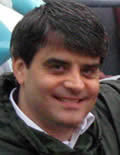
Orlando Woolridge came to Notre Dame in 1977 on Willis Reed’s recommendation, high basketball praise. He made good on his cousin Willis’ word, becoming the sixth pick in the 1981 NBA draft, but Woolridge would have been worth his scholarship for announcer Jack Lloyd’s introductions alone.
As if those rhythmic syllables didn’t have enough rolling Ls and Rs and stretchy Os, Woolridge came from Loooosiana, making him the Platonic ideal of Lloyd’s stirring PA showmanship. Orrrlllllando Woooooolriiidge! His play suited the verbal flash that preceded him into every game.
That’s where my awareness of Woolridge, ND class of 1981, began — and pretty much ended: as the exciting Irish player with the cool name. I knew he had a pro career, although I’d have been hard-pressed to tell you much about it. A recent WNBA coaching job might have come to mind if I had thought about it long enough. Which, of course, I never did. His name remained in the back of my mind, memorable enough to trigger recognition every time I heard it, but I knew nothing about him.
When Woolridge died last month from a chronic heart condition at age 52, the collected details of his life and personality illustrated just how little I knew about the man who once inspired my rapt attention — how little we all know about the athletes who pass through our consciousness, then go on with their lives while we size up their replacements.
For all the emotional energy devoted to favorite, or just plain famous, athletes, our relationship with them is even more temporary and superficial than it seems. To a certain extent, we can never really know them, but we pretend that we do, that their sports performance reveals something intimate and fundamental about their character.
None of those qualities have the biographical weight we want to grant them. Sooner or later the players are relegated to hazy memory anyway, reduced to some characteristic or accomplishment, like the clue on a flash card with their name on the flip side. “Isn’t he the one who …?”
Reading about Woolridge after his death ironically transformed him from faint memory to living, breathing human being. He became, in the recollections of friends and family, a person I would have rooted for even more, if I had only known.
Back when Woolridge lived in Notre Dame’s Fisher Hall, friends drifted into his room for comfort, encouragement, even comedy. One of the regulars, Terry Pfaff ’81, told Melissa Isaacson of ESPNChicago.com that Woolridge considered pretty much everyone a friend. “Just a sweet innocent kid,” his former coach Digger Phelps said, echoing another friend who compared Woolridge to the Tom Hanks character in Big, a playful boy in a power forward’s body. He might have had even more success as a stand-up comic than pro basketball player, Pfaff added: “We’re not talking, ‘Haha funny.’ I mean, you could not keep your food down around him.”
Who knew? We obviously can’t keep track of everyone, let alone know them in the personal ways their friends and family do. Sports Illustrated devotes an annual issue to “where are they now?” stories, tapping into the fascination with catching all the way up with athletes who have faded from mind.
With Woolridge, there was a lot of catching up to do, and not all the details were so childlike and charming. During the 1987-88 NBA season, he served a yearlong substance-abuse suspension. Just this past February, dying and depressed after multiple heart attacks, he was charged with stealing $2,000 worth of aluminum tubing. His mother told Isaacson that the guilt and embarrassment reduced him to tears.
A father of four, Woolridge was under hospice care at his parents’ home in Louisiana when he died, an especially sad ending for someone whose mere presence made so many people happy. To those who remember Woolridge only as a basketball player, the news was a shock — and a stark illustration of the gap between the athlete we know and the person we forget.
Jason Kelly, a former sports columnist for the South Bend Tribune, is an associate editor of the University of Chicago Magazine. His most recent book is Shelby’s Folly: Jack Dempsey, Doc Kearns, and the Shakedown of a Montana Boomtown. Email him at jasonakelly545@gmail.com.